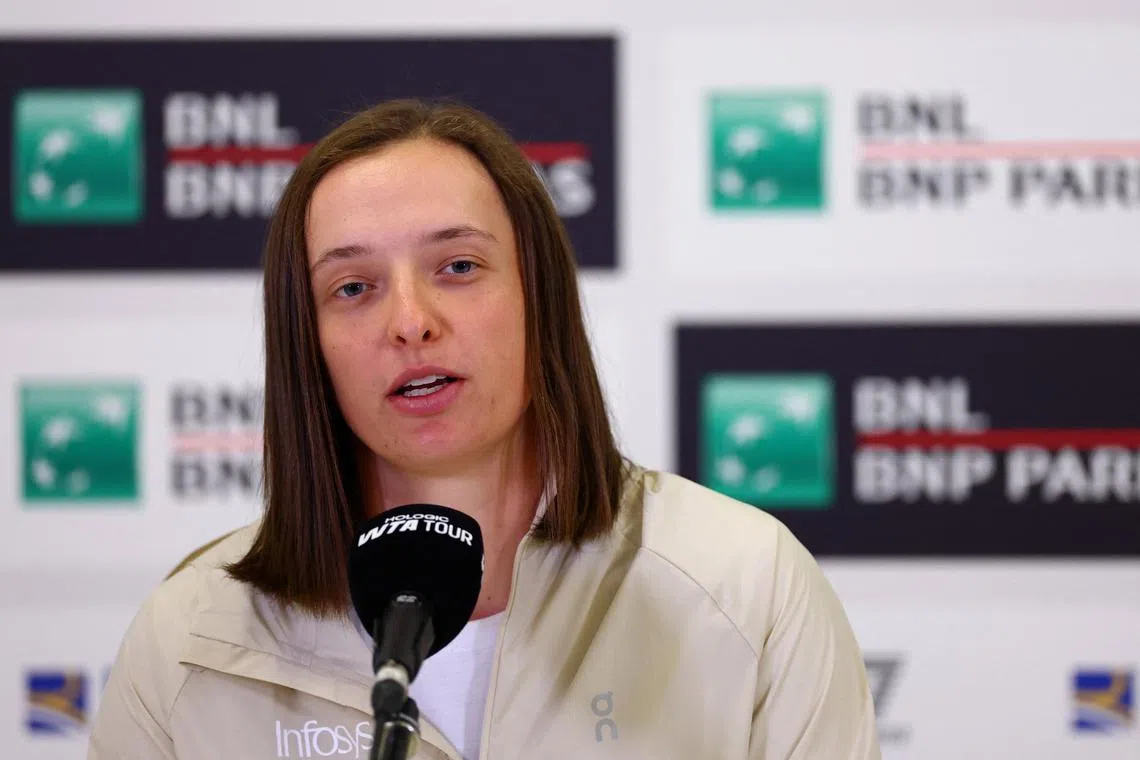Former world No. 1 Iga Swiatek defends coach and psychologist despite disappointing results
Sign up now: Get the biggest sports news in your inbox

Poland's Iga Swiatek has failed to win a tournament since lifting the 2024 French Open title.
PHOTO: REUTERS
ROME – Iga Swiatek has failed to win a tournament in almost a year, but the Polish world No. 2 has defended her coach and psychologist, despite the poor run of results and losing her place at the top of the world rankings in a difficult period.
Swiatek parted ways with her coach Tomasz Wiktorowski in October after three years, adding Belgian Wim Fissette to her team and in November accepted a one-month suspension after testing positive for banned substance trimetazidine.
The five-time Grand Slam winner has drawn a blank since winning the 2024 French Open, and her latest result saw Swiatek lose her Madrid Open title in a crushing 6-1, 6-1 semi-final defeat by Coco Gauff last week.
“Sometimes I’m not happy with the way I play. It’s natural, especially with my perfectionism. This can be seen on the court,” she told Polish media outlet SportoweFakty in an interview.
“However, when I come off it, I can look at the season from a broader perspective.
“Then I find a lot of positives. Reaching the quarter-finals or semi-finals is a good result. Again, I am the most even player of the whole season.”
Swiatek was asked if new coach Fissette was responsible for the lack of success. “No, this is a very harsh and unfair statement,” the 23-year-old said.
“I can only look at the coach from my own perspective, which is the only right one for me, that is, what our work looks like every day.
“The worse results coincided with many other challenges in recent months, also in family life. I found myself at a stage of my career where I had to reformulate my thinking about myself.
Swiatek believes others have improved rather than her regressing.
“The level of tennis in the world is getting higher and higher. The girls got to know my game, they developed themselves,” she said.
“Coco Gauff, who has always been a great talent, is older today and has more experience. Aryna (Sabalenka) managed to make it through the semi-finals and began to win titles.”
Swiatek has been working with sports psychologist Daria Abramowicz for the last six years and she was asked if there was a moment when she thought their cooperation had run its course.
“No. People don’t know it, but practically every year there are different challenges,” she replied.
“When I was suspended, I didn’t want to go out on the court at all for a few weeks. It was the most difficult experience of my career. Daria is a constant support for me, a person I trust. This is my team, I decide who is in it.
“I am irritated by headlines talking about falling apart or a mental crisis. Of course, sometimes I get annoyed on the court. Sometimes I’m not as focused as I’d like.
“But I work, day in and day out, week in and week out, to be better. So there is no reason to make strange judgments or look for fatigue or burnout.”
Alexander Zverev, however, has admitted to burnout.
The defending Italian Open champion said he is now on a “good path”, putting a poor run of form following his defeat in the Australian Open final down to burnout.
The 28-year-old world No. 2 put an end to the dry run – which included opening-round defeats in Indian Wells and Monte Carlo – by winning the ATP title in Munich in mid-April.
The German, who is still seeking his first Grand Slam title, said he should in retrospect have taken time off after losing to Jannik Sinner in straight sets in the Australian Open final at the end of January.
“Before Munich, obviously my level of play wasn’t great,” he said on May 6.
“There are reasons for it. I think not taking time off after Australia was a big reason for it. I felt like I burned out a little bit.”
Zverev said the life of a professional tennis player was an incessant cycle of travelling and playing without any time to rest.
“Tennis is a tough sport,” he said.
“We play a lot. We travel a lot. First of all, we don’t give our bodies rest, but we also don’t give our heads rest.
“They don’t get mental rest. I needed that a little bit.
“I’m on a good path. I won a tournament two weeks ago. I cannot forget that. And I have to focus on the positives.”
In the women’s round of 128 on May 7, former world No. 1 and four-time Grand Slam winner Naomi Osaka beat veteran Italian Sara Errani 6-2, 6-3. Another former top-ranked player Victoria Azarenka defeated Colombia’s Maria Camila Osorio by the same score. REUTERS


